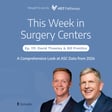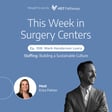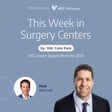
Annual Budget Planning: Knowing Your Audience
We're excited to kick off a brand-new series all about Annual Budget Planning. This is something that every surgery center needs to do to some degree to make sure the following year is successful, and everyone's on the same page. But here's the interesting part: in the conversations I've had while prepping for this series, it's clear that no two ASCs handle budget planning the same way. The process varies widely, and the budget's role in daily operations can look very different depending on the center.
I sat down with Suzi Walton and Matt Cavanagh to get us started. Suzi, the administrator at Ohio Surgery Center, has over a dozen budget cycles under her belt. Matt, a Principal at Clifton, Larson, Allen, has nearly 20 years of experience working directly with ASCs. Together, they shared insights on how your approach to budget planning might shift depending on your audience. Whether you're physician-owned, part of a management group, or involved in a joint venture, Suzi and Matt explain how these ownership models influence the budgeting process.
After my conversation with Suzi and Matt, we'll switch to our Data & Insights segment. In September, HST released our annual State of the Industry report, which analyzed client data from 590 surgery centers. The metric I'm excited to dive into today with you is OR Block Utilization trends. We'll cover what the 2024 numbers showed and tips for improving OR utilization overall.
Resources Mentioned:
- View the online version of the State of the Industry Report
- Request a free, printed copy of the report
- Listen to the podcast episode on Maximizing OR Utilization Through Block Time Optimization
Brought to you by HST Pathways.



















